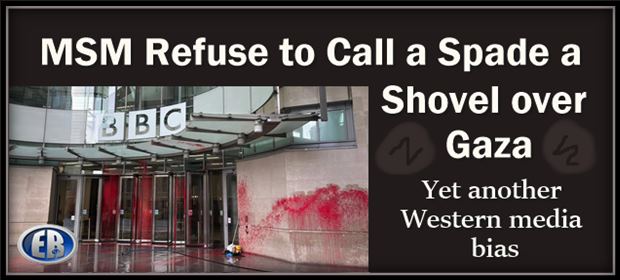
ER Editor: See this corresponding piece put out by Consortium News —
Media Dare Not Call It Genocide
New Zealand’s national broadcaster has justified removing references to “genocide” in Gaza made by a Palestinian guest on its podcast because it would have otherwise “stolen valuable time.”
It is part of a trend among national broadcasters in English-speaking countries to shy away from what U.N. experts have begun naming Israel’s conduct in Gaza.
We do recommend the Al Jazeera piece linked to below –
As Israel pounds Gaza, BBC journalists accuse broadcaster of bias
***
The letter by BBC journalists to Al Jazeera complaining about Beeb bias over Gaza was sent anonymously. Of note:
Fearing reprisal, the journalists requested anonymity. The group does not plan to send the letter to BBC executives, believing such a move was unlikely to lead to meaningful discussions.
They sent Al Jazeera the letter as a humanitarian disaster in Gaza escalates, and as grim milestones are reached at pace. At the time of writing, more than 14,500 Palestinians have been reported as killed by Israeli bombardment, including at least 6,000 children.
“The BBC has failed to accurately tell this story – through omission and lack of critical engagement with Israel’s claims – and it has therefore failed to help the public engage with and understand the human rights abuses unfolding in Gaza,” the letter reads. “Thousands of Palestinians have been killed since October 7. When will the number be high enough for our editorial stance to change?”
…
Fallout across global newsrooms
The war has led to bitter divides across other newsrooms, too.
An unnamed reporter at The Guardian, with family in southern Israel, wrote in the Jewish News that they felt disillusioned by the newspaper’s coverage and working environment after the Hamas attacks, claiming their colleagues were unsupportive.
“I think that Israel must defend itself. Yet when I say this, people will tell me I am justifying the murder of children. They will tell me it is a genocide,” they wrote.
Anne Boyer, a poetry editor for The New York Times, quit last week, ostensibly over the paper’s editorial stance.
Apparently taking aim at the newspaper’s language on the war, she said: “I can’t write about poetry amidst the ‘reasonable’ tones of those who aim to acclimatize us to this unreasonable suffering. No more ghoulish euphemisms. No more verbally sanitized hellscapes. No more warmongering lies.”
Jazmine Hughes, a writer for The New York Times, resigned after signing a solidarity statement that described “Gaza’s people” as “victims of a genocidal war”.
Journalist and illustrator Mona Chalabi, who works for The Guardian US and freelances for The New York Times, posted on Instagram on October 18 that The New York Times has “consistently mentioned Israeli deaths more often than Palestinian deaths. What’s more, their coverage of Israeli deaths is *increasing* as more Palestinians are dying”.
Meanwhile, at the Los Angeles Times, staffers who signed a protest letter in solidarity with journalists in Gaza have been blocked from covering the war for three months, Semafor reported.
According to the BBC’s rules on impartiality, editorial staff “should not participate in public demonstrations or gatherings about controversial issues”.
********
BBC journos accuse organization of pro-Israel bias
The British public broadcaster previously came under fire for suspending employees over ‘pro-Palestine’ social media posts
THE CRADLE NEWSDESK
BBC journalists wrote a letter to Al-Jazeera to express their dissatisfaction with the British broadcaster over its coverage of Gaza, the Qatari news organization revealed on 23 November.
 (Photo Credit: The Telegraph)
(Photo Credit: The Telegraph).
“The BBC has failed to accurately tell this story – through omission and lack of critical engagement with Israel’s claims – and it has therefore failed to help the public engage with and understand the human rights abuses unfolding in Gaza,” the letter reads.
“Thousands of Palestinians have been killed since October 7. When will the number be high enough for our editorial stance to change?”
The journalists accused the BBC of repeatedly humanizing Israeli victims over Palestinians, abandoning vital historical context in their coverage.
BBC journalists continued to slam the UK public broadcaster by saying that terms such as “massacre” and “atrocities” have been exclusively used “only for [the actions of] Hamas, framing the group as the only instigator and perpetrator of violence in the region. This is inaccurate but aligns with the BBC’s overall coverage.”
“In comparison, humanizing coverage of Palestinian civilians has been lacking. It is a poor excuse to say that the BBC could not better cover stories in Gaza because of difficulties gaining access to the [Gaza] Strip … This is achieved, for example, by telling and following individual stories across weeks. Little attempt has also been made to fully utilize the abundance of social media content from brave journalists in Gaza and the West Bank,” the journalists wrote.
On 10 October, Husam Zomlot, the head of the Palestinian Mission to the UK, spoke to presenter Kirsty Wark about his familial losses due to Israeli bombings of Gaza; Wark responded, “I am sorry for your own personal loss. I mean, can I just be clear, though? You cannot condone the killing of civilians in Israel, can you?”
“My cousin is not Hamas. These kids are not Hamas.”
Husam Zomlot, Head of the Palestinian Mission to the UK, lost 6 family members amongst the almost 700 killed in Israeli strikes into Gaza.#Newsnight pic.twitter.com/Oih0hpWhxt
— BBC Newsnight (@BBCNewsnight) October 9, 2023
Al-Jazeera spoke to one of the letter’s co-authors, who said, “For me, and definitely for other people of color, we can see blatantly that certain civilian lives are considered more worthy than others – that there is some sort of hierarchy at play. That is deeply, deeply hurtful because actually, none of us struggle to empathize with Palestinian civilians.”
Other BBC journalists have been critical of the broadcaster’s coverage since start of the war. Rami Ruhayem, Beirut correspondent for the BBC, wrote to the news organization’s director-general, saying there are “indications that the BBC is – implicitly at least – treating Israeli lives as more worthy than Palestinian lives and reinforcing Israeli war propaganda.”
The BBC has shown bias in other cases; during the early days of the war, the London-based organization suspended and investigated several of their West Asia journalists for social media activity that they claimed to be “pro-Palestinian.”
************
Source

••••
The Liberty Beacon Project is now expanding at a near exponential rate, and for this we are grateful and excited! But we must also be practical. For 7 years we have not asked for any donations, and have built this project with our own funds as we grew. We are now experiencing ever increasing growing pains due to the large number of websites and projects we represent. So we have just installed donation buttons on our websites and ask that you consider this when you visit them. Nothing is too small. We thank you for all your support and your considerations … (TLB)
••••
Comment Policy: As a privately owned web site, we reserve the right to remove comments that contain spam, advertising, vulgarity, threats of violence, racism, or personal/abusive attacks on other users. This also applies to trolling, the use of more than one alias, or just intentional mischief. Enforcement of this policy is at the discretion of this websites administrators. Repeat offenders may be blocked or permanently banned without prior warning.
••••
Disclaimer: TLB websites contain copyrighted material the use of which has not always been specifically authorized by the copyright owner. We are making such material available to our readers under the provisions of “fair use” in an effort to advance a better understanding of political, health, economic and social issues. The material on this site is distributed without profit to those who have expressed a prior interest in receiving it for research and educational purposes. If you wish to use copyrighted material for purposes other than “fair use” you must request permission from the copyright owner.
••••
Disclaimer: The information and opinions shared are for informational purposes only including, but not limited to, text, graphics, images and other material are not intended as medical advice or instruction. Nothing mentioned is intended to be a substitute for professional medical advice, diagnosis or treatment.





Leave a Reply